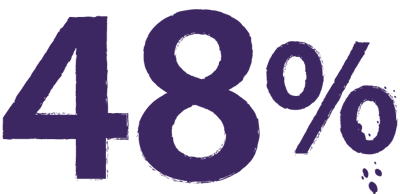Want to know an alarming statistic about racial and ethnic discrimination and bias in the workplace?

It’s not just some random number – it's the percentage of people who’ve experienced bias or discrimination in their search for work, according to our extensive survey of more than 200 mainly BIPOC professionals.
It’s important to remember that behind every statistic is a story, and behind every story is someone impacted by bias or discrimination in the professional workplace. These aren’t just lifeless numbers – they're your current and prospective members.
So, does your association just have to watch racism and ethnic discrimination from the sidelines?
No.
Your association can and absolutely should take action now to fight against racism and for a more inclusive and equitable workplace. We examine the statistics in detail below and offer some useful, actionable tips for how associations like yours can be an ally for BIPOC members as they look to advance their careers.

“My last job refused to promote me, instead promoting people from their ethnic background.”
- A survey respondent when asked: Do you believe your career growth opportunities are negatively affected by your ethnicity?


A Hard Look at the Data
The eye-popping stat that nearly half of our survey respondents reported experiencing bias or discrimination in their search for work is only the tip of the iceberg. Our survey also revealed additional data that should pique the interest of associations everywhere that value both inclusivity and the mission of helping their members advance their careers.
In addition to experiencing bias and discrimination in their job search, BIPOC professionals also experienced bias and discrimination at their workplace itself.
Our survey revealed a number of other concerning statistics. Just a few of these were:


73% felt that their career growth opportunities were negatively impacted by their race or ethnicity
A lackluster 62% said that their employer enacts and enforces policies that provide for equitable treatment



47% reported experiencing bias or discrimination at their current or last role
60% said that they felt they couldn’t be their authentic selves while at work
Only 15% said that their employer “always” follows through with any promised DEI commitments

“Black people routinely get passed up for jobs by white people who are often under qualified.”
- A survey respondent when asked: Do you believe your career growth opportunities are negatively affected by your ethnicity?

Clearly, this data indicates that bias and discrimination are an unfortunate part of everyday life for BIPOC professionals. They also clearly don’t feel like they’re getting nearly enough support from their employers when it comes to ensuring their workplace is inclusive and equitable, despite facing widespread racism and ethnic discrimination.
Fortunately, this is where associations like yours can step up and lead the fight against discrimination and bias and ally with BIPOC professionals looking to advance their careers.

“I have an ethnic sounding name which makes it easy for an employer to discriminate against before even meeting"
- A survey respondent when asked: Are you concerned your ethnicity might have a negative effect on your ability to successfully compete for jobs?

Interested in Learning More?
Download our Free eBook

How Can Associations Help BIPOC Members Advance Their Careers?
Associations can take action to become better allies for their BIPOC members, enacting policies to help them advance their careers and combat racism and bias in the workplace. We examine a few of these steps in detail below!
Review and Implement New DEI Policies
First and foremost, carefully review your current DEI policies and gauge how your members feel about them. See how they can be strengthened and implement new policies designed to dignify BIPOC professionals and others from historically disadvantaged groups with the goal of helping them further their careers in your industry.
Leveraging external DEI experts and organizations to review your current policies and design new ones is a great idea to consider too.
Establish a Code of Conduct
Establish a code of professional conduct and ethics for your association that puts inclusivity and equity at the front and center. Doing so can help foster a culture that values inclusion and empowers members of all backgrounds.
Turn Your Career Center into a DEI Hub
Your career center can be a valuable tool not just for helping connect members with employment opportunities and network, but also for promoting inclusion. Consider turning your career center into a DEI hub, complete with resources such as articles, helpful links and your association’s DEI statement.
This way, you can merge your main platform for helping members find new opportunities with direct access to your DEI content, giving BIPOC professionals and other the tools they need to further their career all under one roof.
Create a Safe Space for Members to Share Their Stories
Encourage your association members to share their stories of how they’ve experienced bias or discrimination in forums like webinars or in-person workshops. This can help humanize the impact that racial bias and discrimination has and prompt your association’s members to become allies of BIPOC professionals and others from historically disadvantaged groups.
Offer Personalized Support for Members Who’ve Experienced Bias or Discrimination
If a member comes forward with a story of how bias or discrimination has impacted them personally or hurt their career, take it to heart. Offer them individualized support to show your association is serious about combatting racism and bias and work with them to get their career back on track on a one-on-one basis.
Partner with Relevant Organizations
Plenty of relevant organizations with the goal of advancing BIPOC causes exist. Look into partnerships with them to better understand your BIPOC members, advocate for inclusion and obtain resources to support BIPOC professionals in your association.
Promote DEI Initiatives in Your Industry
Take the lead in actively promoting DEI in your industry. This way, current members will understand your association fully grasps the need for inclusion and equity and prospective members may be further enticed to join.
Create and Empower a DEI Committee
Many associations have DEI committees, but simply creating one isn’t enough.
Make sure your DEI committee is empowered to not only give input on policies, but is a full-fledged stakeholder that works closely with your association’s leadership to develop, implement and improve policies designed to advance inclusion and fairness.

“Being a woman, it's hard to breach the glass ceiling. Being a black woman is even harder.”
- A survey respondent when asked: Do you believe your career growth opportunities are negatively affected by your ethnicity?


Take Action Today for Inclusivity and Justice
Your association shouldn’t be just another bystander in the fight for a more inclusive and just professional workplace. As we explored above, there’s plenty of steps you can take to become a better ally for your BIPOC members as they look to advance their careers. By taking these steps, your association can better engage and retain current members as well as establish itself as an industry leader in DEI, enticing new members to join.
Interested in learning more? Download our eBook on how associations can foster inclusivity for BIPOC professionals and sign up to attend our workshop on Thursday, October 28 to hear from the experts first-hand!


